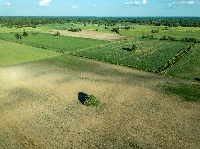The "Special Report on Climate Change and Land Use" of the Intergovernmental Panel on Climate Change (IPCC) was launched today. It states that human activities currently affect 75% of the earth's surface, leading to widespread land degradation and climate change. The main causes of land degradation and carbon emissions are agriculture and forestry.
The report was developed over two years by 107 scientists from 52 countries and is based on 7,000 scientific studies and articles. It addresses issues such as climate change, greenhouse gas (GHG) emissions into terrestrial ecosystems, desertification, land degradation, sustainable land management and food security. The report's authors have also looked for ways to adapt to climate change and reduce tillage-related emissions or promote carbon sequestration in the soil.
The authors confirm that land use and management play a key role in climate change. Soil and vegetation both emit and store greenhouse gases. Its carbon circulates between the atmosphere and the earth and is stored in soil and biomass. At times when the soil is degraded, deforested and extensive monoculture plantations are planted, the soil system releases the carbon that has been stored in it, leading to climate change.
According to the report, agriculture is a significant source of greenhouse gases, accounting for about 12% of total anthropogenic or anthropogenic emissions. Emissions from agriculture have almost doubled between 1961 and 2016.
The report places particular emphasis on the interplay between climate change and land use: not only does land use contribute to climate change, but, conversely, climate change contributes to land use change. For example, climate change is changing the weather, which can reduce or destroy crops.
The study states that land use change must be part of climate change mitigation. To do this effectively, land use practices need to be reviewed with a view to introducing carbon sequestration and reducing carbon emissions.
For the second year in a row, the Latvian Fund for Nature is implementing the LIFE CRAFT project, the aim of which is to test and practically demonstrate GHG-reducing agricultural practices in Latvia, which at the same time reduce carbon emissions and ensure the economic sustainability of farmers. Within the framework of the project, in cooperation with farms, three methods are tested and evaluated - direct sowing, incorporation of bio-carbon into the soil and controlled drainage.
Project manager Laura Zvingule points out: “There are countries where, for example, direct sowing is already being used successfully, and it is clear that our farmers also need to change and take into account the global climate crisis in their work. These are significant changes in both activities and thinking, but I hope that more and more Latvian farmers will join climate-friendly farming.”
